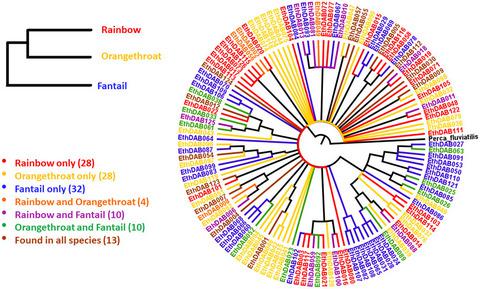当前位置:
X-MOL 学术
›
Ecol. Evol.
›
论文详情
Our official English website, www.x-mol.net, welcomes your
feedback! (Note: you will need to create a separate account there.)
Trans-specific polymorphism and the convergent evolution of supertypes in major histocompatibility complex class II genes in darters (Etheostoma)
Ecology and Evolution ( IF 2.3 ) Pub Date : 2022-01-13 , DOI: 10.1002/ece3.8485 Kara M Million 1 , Curtis M Lively 1
Ecology and Evolution ( IF 2.3 ) Pub Date : 2022-01-13 , DOI: 10.1002/ece3.8485 Kara M Million 1 , Curtis M Lively 1
Affiliation

|
Major Histocompatibility Complex (MHC) genes are one of the most polymorphic gene groups known in vertebrates. MHC genes also exhibit allelic variants that are shared among taxa, referred to as trans-specific polymorphism (TSP). The role that selection plays in maintaining such high diversity within species, as well as TSP, is an ongoing discussion in biology. In this study, we used deep-sequencing techniques to characterize MHC class IIb gene diversity in three sympatric species of darters. We found at least 5 copies of the MHC gene in darters, with 126 genetic variants encoding 122 unique amino acid sequences. We identified four supertypes based on the binding properties of proteins encoded by the sequences. Although each species had a unique pool of variants, many variants were shared between species pairs and across all three species. Phylogenetic analysis showed that the variants did not group together monophyletically based on species identity or on supertype. An expanded phylogenetic analysis showed that some darter alleles grouped together with alleles from other percid fishes. Our findings show that TSP occurs in darters, which suggests that balancing selection is acting at the genotype level. Supertypes, however, are most likely evolving convergently, as evidenced by the fact that alleles do not form monophyletic groups based on supertype. Our research demonstrates that selection may be acting differently on MHC genes at the genotype and supertype levels, selecting for the maintenance of high genotypic diversity while driving the convergent evolution of similar MHC phenotypes across different species.
中文翻译:

蛇鲈(Etheostoma)主要组织相容性复合体 II 类基因的反式特异性多态性和超型的趋同进化
主要组织相容性复合体 (MHC) 基因是脊椎动物中已知最多态性的基因组之一。 MHC 基因还表现出类群之间共享的等位基因变异,称为反式特异性多态性 (TSP)。选择在维持物种内如此高的多样性以及 TSP 方面所发挥的作用是生物学界不断讨论的话题。在这项研究中,我们使用深度测序技术来表征三种同域的蛇鲈的 MHC IIb 类基因多样性。我们在鲈鱼身上发现了至少 5 个 MHC 基因拷贝,其中有 126 个遗传变异编码 122 个独特的氨基酸序列。我们根据序列编码的蛋白质的结合特性鉴定了四种超型。尽管每个物种都有独特的变异库,但许多变异在物种对之间以及所有三个物种之间共享。系统发育分析表明,这些变体并没有根据物种身份或超型以单系的方式分组在一起。扩展的系统发育分析表明,一些鲈鱼等位基因与其他鲈鱼的等位基因组合在一起。我们的研究结果表明,TSP 发生在蛇鲈身上,这表明平衡选择是在基因型水平上发挥作用的。然而,超型很可能是趋同进化的,等位基因不会根据超型形成单系群这一事实就证明了这一点。我们的研究表明,选择可能在基因型和超型水平上对 MHC 基因产生不同的作用,选择维持高基因型多样性,同时推动不同物种之间相似 MHC 表型的趋同进化。
更新日期:2022-01-14
中文翻译:

蛇鲈(Etheostoma)主要组织相容性复合体 II 类基因的反式特异性多态性和超型的趋同进化
主要组织相容性复合体 (MHC) 基因是脊椎动物中已知最多态性的基因组之一。 MHC 基因还表现出类群之间共享的等位基因变异,称为反式特异性多态性 (TSP)。选择在维持物种内如此高的多样性以及 TSP 方面所发挥的作用是生物学界不断讨论的话题。在这项研究中,我们使用深度测序技术来表征三种同域的蛇鲈的 MHC IIb 类基因多样性。我们在鲈鱼身上发现了至少 5 个 MHC 基因拷贝,其中有 126 个遗传变异编码 122 个独特的氨基酸序列。我们根据序列编码的蛋白质的结合特性鉴定了四种超型。尽管每个物种都有独特的变异库,但许多变异在物种对之间以及所有三个物种之间共享。系统发育分析表明,这些变体并没有根据物种身份或超型以单系的方式分组在一起。扩展的系统发育分析表明,一些鲈鱼等位基因与其他鲈鱼的等位基因组合在一起。我们的研究结果表明,TSP 发生在蛇鲈身上,这表明平衡选择是在基因型水平上发挥作用的。然而,超型很可能是趋同进化的,等位基因不会根据超型形成单系群这一事实就证明了这一点。我们的研究表明,选择可能在基因型和超型水平上对 MHC 基因产生不同的作用,选择维持高基因型多样性,同时推动不同物种之间相似 MHC 表型的趋同进化。

































 京公网安备 11010802027423号
京公网安备 11010802027423号